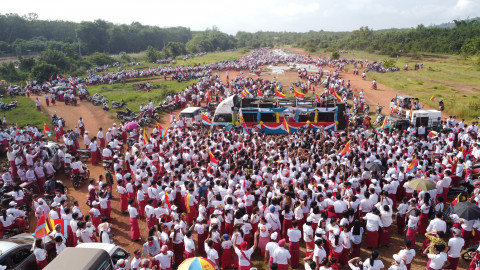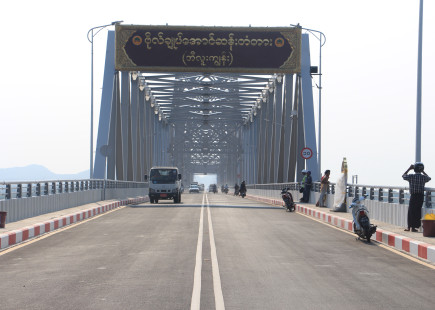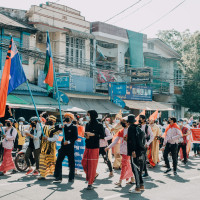ပြန်လည်သုံးသပ်ရန် လိုအပ်သည့် မွန်နိုင်ငံရေး နှင့် “၈” လပြည့် စစ်အာဏာရှင်ခရီး စာရေးသူ - ကွန်းဝု
Regions
၂၀၂၀ အထွေထွေရွေးကောက်ပွဲတွင် မွန်ညီညွတ်ရေးပါတီသည် နိုင်ငံရေးအရ အောင်မြင်မှု မျှော်လင့်ချက်အား အခိုင်အမာပြသခဲ့သည်။ ဖေဖော်ဝါရီလတွင် နိုင်ငံတော် စီမံအုပ်ချုပ်ရေး ကောင်စီ၏ အာဏာသိမ်းမှုဖြင့် ယင်းတို့သည် ရုတ်တရက် ပြီးဆုံးသွားခဲ့သည်။ ထိုအချိန်မှစပြီး မွန်နိုင်ငံရေးသည် ကွဲပြားလာသည်။ တစ်နိုင်ငံလုံး ပြိုကွဲနေချိန်တွင် အချို့ခေါင်းဆောင်များသည် နိုင်ငံတော်စီမံအုပ်ချုပ်ရေးကောင်စီ နှင့် ပူးပေါင်းဆောင်ရွက်ရေးကို လက်ခံကြသလို အချို့က အမျိုးသားညီညွတ်ရေးအစိုးရအား ထောက်ခံကြောင်း ကြေငြာကြပြီး အချို့ကလည်း မွန်ပြည်သူ များကို သတိထားရန် တိုက်တွန်းထားသည်။ ကွန်းဝု သည် မွန်တို့၏ လှုပ်ရှားမှုနှင့် ရင်ဆိုင်နေရ သော အကျပ်အတည်းများကို ခွဲခြမ်းစိတ်ဖြာပြထားပြီး သမိုင်းမှ သင်ခန်းစာများကိုယူရန် အဘယ့်ကြောင့် လိုအပ်ကြောင်း ရှင်းပြထားသည်။

မွန်ညီညွတ်ရေးပါတီ၊ ၂၀၂၀ အထွေထွေရွေးကောက်ပွဲ မဲဆွယ်စည်းရုံးခြင်း၊ ရေးမြို့နယ်။
နိုင်ငံရေး လမ်းကြောင်း
မြန်မာနိုင်ငံတွင် စစ်အာဏာ သိမ်းခဲ့သည်မှာ ယခုဆိုရင် ၈ လ ကျော်လာခဲ့ပြီဖြစ်ပြီး အဆိုးတကာ ထဲက အဆိုးဆုံးအချိန်လည်း ဖြစ်သည်။ ထိုအထဲတွင် မွန်ပြည်နယ်လည်း တစ်ခု အပါအဝင် ဖြစ်သည်။ လူမှုရေး၊ စီးပွားရေး၊ ကျန်းမာရေး၊ စားဝတ်နေရး၊ ပညာရေး အရေးပေါင်း မြောက်များစွာ၊ အခက်အခဲ ပေါင်းမြောက်များစွာနှင့် အသက်ပေါင်းမြောက်များစွာ စတေးခဲ့ရပြီး ဖြစ်သည်။ စစ်ဗိုလ်ချုပ်များမှာလည်း အပြောကောင်းသလောက် အလုပ်မှာ မယ်မယ်ရရ ဘာမှ အောင်မြင်မှုမရှိဘဲ နိုင်ငံတွင်း ဆင်းရဲသထက်ပိုပြီးတော့ ဆင်းရဲလာခဲ့သည်။
ထို့အတူ ဒီမိုကရေစီ လိုလားကြသူများ၏ အာဏာရှင် ဖြုတ်ချရေး အိမ်မက်သည်လည်း ရုန်းကန်ရင်း အကောင်အထည် မဖော်ဆောင်နိုင်သေးပေ။ တစ်ခုထဲသော များပြားလာခြင်းမှာ နိုင်ငံအတွင်း အလောင်းများသာဖြစ်သည်။ တစ်ချိန်တည်းမှာပင် ကိုဗစ် တတိယလှိုင်းသည် စစ်အာဏာသိမ်းပြီးချိန်တွင် ဖြစ်ပွားခဲသည်။ သို့သော် စစ်အာဏာရှင်များသည် ကပ်ရောဂါအတွက် ပြင်ဆင်မှုမရှိဘဲ အခွင့်ကောင်းကိုသာ ယူခဲ့ကြသည့်အတွက်ကြောင့် ပြည်သူများ၏ အသက်များစွာ စတေးခဲ့ကြရသည်။ ထိုထိခိုက်မှုများကို တစ်နိုင်ငံလုံး ခံစားကြရပြီး ထိုအထဲတွင် မွန်ပြည်နယ် လည်း အပါဝင်ဖြစ်သည်။ ၈ လ ကျော်ကြာ အာဏာသိမ်းခြင်း၏ ခရီးရလဒ်မှာ ငိုကြွေးသံများ၊ ပူဆွေးသောကများ၊ အိုးမဲ့အိမ်မဲ့ဘဝများ၊ အပစ်မဲ့အလောင်းများ၊ ဆုံးရှုံးသွားသော မိသားစု ဘဝများ၊ ပျောက်ဆုံးသွားသော လူငယ်များ၏ အနာဂါတ်၊ အိမ်မက်များနှင့်အတူ အရွယ်မတိုင်ဘဲ ကြွေခဲ့ရသည့် ကြယ်ကလေးများ လည်း မရည်တွက်နိုင်အောင်ပင်ဖြစ်သည်။
၂၀၂၁ ဖေဖော်ဝါရီလ ၁ ရက်နေ့မှ စစ်အာဏာရှင် (စကစ) နှင့်ပူပေါင်းလိုက်သည့် နိုင်ငံရေးအဖွဲ့ အစည်းများအထဲတွင် မွန်ညီညွတ်ရေးပါတီလည်း အပါအဝင်ဖြစ်သည်။ မတူညီသည့် ပြည်သူ အမျိုးအမျိုးထံမှ ဝေဖန်မှုအမျိုးမျိုးလည်း ထွက်ပေါ်လာခဲ့သည်။ ၂၀၂၀ ရွေးကောက်ပွဲတွင် မွန်နိုင်ငံရေး အင်အားစုများကို မွန်လူထု အမြောက်အများက ထောက်ခံကြပြီး ရလဒ်ကောင်း များလည်း ထွက်ခဲ့သည်။ ပြည်တွင်းစစ်နှစ်ပေါင်း ၆၀ ကျော်အတွင်း ၂၀၂၀ ရွေးကောက်ပွဲသည် မွန်တို့၏ နိုင်ငံရေးအတွက် သမိုင်းတွင်စေခဲ့သော ရွေကောက်ပွဲလည်း ဖြစ်သည်။
ထိုရွေးကောက်ပွဲအချိန် ကဆိုလျှင် မွန်လိုမျိုးများသည် မွန်ပါတီကို မဲပေးရခြင်းအတွက် မိမိကိုယ်ကိုဂုဏ်ယူပြီး ပျော်ရွင်စွာ မဲပေးခဲ့ကြသည်။ မွန်ပြည်သူ၏ ဆန္ဒမဲသည် မွန်လူမျိုးအတွက် ဟူ၍လည်း ကြွေးကြော်ခဲ့ကြသည်။ မွန်လူမျိုး တစ်ယောက်ဖြစ်ပြီး မွန်ပါတီကို မဲပေးခွင့်ရခြင်းသည် ဂုဏ်ယူမဆုံးဖြစ်သည်။ ၂၀၂၀ ရွေးကောက်ပွဲသည် မွန်နိုင်ငံရေး အတွက် အလှပဆုံး ပန်းချီးကား တစ်ချပ်ဟု ပြောမယ်ဆိုင်ရင်လည်း မမှားပေ။ ကံမကောင်းစွာဖြင့် အချိန်သိပ်မကြာခင် မှာပင် အာဏာရှင် စစ်တပ်မှ ထိုပန်းချီကားကို အရောင်းအသွေး မဲ့အောင် ပြုလုပ်ခဲ့သည်။
ဘာကြောင့် မွန်လိုမျိုးများသည် မွန်ပါတီကို မေးပေးသလဲ ဆိုလျှင် မွန် နှစ်ပါတီ ပေါင်းစည်းခြင်း သည် မွန့်တို့၏ အင်အားဖြစ်သည်။ မြုပ်ချည်ပေါ်ချည် ဖြစ်နေသော မွန်နိုငံရေးအတွက် ဒီပေါင်းစည်းခြင်းအားသည် မွန်တို့အတွက် မျှော်မှန်းထားသည့် အနာဂါတ် ဖက်ဒရယ် ပြည်ထောင်စု ကြီးကို တည်ဆောက်ရန် ဒေါင့်တိုင်ဖြစ်ပြီး မွန်လူမျိုးတို့၏ အဓိက တောင်းဆိုချက် ဖြစ်သည့် မိမိကံကြမ္မာမိမိတို့ ဖန်းတီးပိုင်ခွင့် နှင့် အမျိုးသားတန်းတူရေးရရှိရန် ဖြစ်သည်။ အခက်အခဲ ပေါင်းမြောက်များစွာနှင့်အတူ မတူညီသည့် ဂိုဏ်းပေါင်းစုံမှ မွန်သံဃာ ကိုယ်စားလှယ် များ၊ တတ်သိပညာရှင်များ၊ လူငယ်များနှင့် မွန်ပြည်သူ၊ ပြည်သားများ၏ ပူးပေါင်းကြိုးစား အားထုတ်မှုကြောင့် မတူညီသည့် မွန်နှစ်ပါတီမှ ပြန်လည်ပေါင်းစည်းနိုင်ခြင်း၏ ရလဒ်ဆိုလျှင်လည်း မမှားပေ။
သို့ပေမယ့် ကံအကြောင်းမလှဘဲ ဖေဖော်ဝါရီ လ ၁ ရက်နေ့တွင် စစ်တပ်မှ တစ်နိုင်ငံလုံးရှိ ပြည်သူ့အာဏာကို မဲမသမာမှုများကြောင့် ဟု အကြောင်းပြပြီး အာဏာသိမ်းလိုက်သည်။ စစ်အာဏာရှင်များသည် အာဏာသိမ်းပြီးသည့်နောက်ပိုင်း ၎င်းနှင့်အတူ လက်တွဲဖော်ပြုလုပ်ရန် မြန်မာနိုင်ငံအတွင်းမတူကွဲပြားသည့် နိုင်ငံရေးပါတီများကို ချဉ်းကပ်ပြီး ပူးပေါင်းရန်ကြိုးစားခဲ့သည်။ တိုင်းရင်းသားပါတီတော်တော်များများသည် အာဏာရှင် စစ်တပ်နှင့် ပူးပေါင်းရန် ငြင်းဆန်မှုများ ရှိသလို တစ်ချို့သော ပါတီများကလည်း အာဏာရှင် စစ်တပ်နှင့် ပူးပေါင်းရန် သဘောတူသည့် ပါတီလည်းရှိသည်။ ထိုပါတီအထဲတွင် မွန်လူမျိုး အမြောက်အများကို ကိုယ်စားပြုထားသည့် (မွန်တို့၏ နိုင်ငံရေးအသဲနှလုံး) မွန်ညီညွတ်ရေးပါတီလည်း ပူးပေါင်းရန်သဘောတူခဲ့ကြသည်။
ထိုသဘောတူညီချက်သည် ပါတီအတွင်း သဘောထားမတိုက်ဆိုင်မှုများကို ဖြစ်စေခဲ့ပြီး ပါတီမှ နှုတ်ထွက်သည့် သူများလည်းရှိသည်။ ထိုဂယက်သည် ပါတီအတွင်း ရိုက်ခတ်မှု သက်သက် မဟုတ်ဘဲ မွန်လူထုတစ်ဝန်းလုံးအတွက် ကြီးမားသော ဂယက်တစ်ခုလည်း ဖြစ်ပေါ်လာ ခဲ့သည်။ မည်သို့ပင်ဆိုစေ ဆုံးဖြတ်ချက်မှန်သည်ဟု ခံယူထားသည့် အစုအဖွဲ့ ပေါ်လာသလို၊ ဆုံးဖြတ်ချက်ကို လက်မခံနိုင်သည့် အစုအဖွဲ့လည်း ပေါ်လာခဲ့ပါသည်။ သို့သော် မွန်တို့၏ အင်အား သည် မွန်တို့၏ စုပေါင်းစည်းလုံးခြင်း ဖြစ်သည့်အတွက် ယခုလို ကွဲပြားခြင်းသည် မွန်တို့၏ အားနည်းချက်တစ်ခုဖြစ်သည်ဟုထင်မိသည်။

ဗိုလ်ချုပ်အောင်ဆန်းတံတား (ဘီလူးကျွန်း)
သံလွင်တံတားနှင့် မွန်နိုင်ငံရေး အကျပ်ရိုက်မှု
ယခု စစ်အာဏာသိမ်းပြီး ၈ လ ကျော်ကြာမြင့်ခဲ့ပြီးနောက် မွန်ညီညွတ်ရေးပါတီ၏ ဆုံးဖြတ်ချက် သည် မှန်သည်၊ မှားသည် ဆိုသည်မှာ အချိန်နှင့်လုပ်ဆောင်မှုများက သက်သေပင်ဖြစ်သည်။ စစ်အာဏာရှင်နှင့် ပူးပေါင်းလိုက်ပြီးနောက် စစ်ကောင်စီမှ ဖွဲ့စည်းထားသည့် နိုင်ငံတော် ကောင်စီနှင့် ပြည်နယ်ကောင်စီတွင် တစ်နေရာစီရရှိကြသည်။ ဇွန်လ ၁ ရက်နေ့တွင် မော်လမြိုင်နှင့် ဘီလူးကျွန်းကိုဆက်သွယ်ထားသည့် တံတားအမည်ကို အောင်ဆန်းတံတားမှ သံလွင်တံတားအဖြစ် ပြောင်းလဲအမည်တင်ဆိုင်းပုဒ်ပြုလုပ်ခဲ့သည်။ မွန်လူမျိုးများ လိုချင်သည့် အမည်မှာ “ရာမည” တံတားဖြစ်သည်။ *
မွန်ပြည်နယ်သည် မတူကွဲပြားမှုများစွာနှင့် တည်ဆောက်ထားသော ပြည်နယ်တစ်ခု ဖြစ်သည်။ ထို့အတူ နိုင်ငံရေး အမြင်များမှာလည်း မတူကွဲပြားမှု မြောက်များစွာရှိကြပါသည်။ မည်ကဲ့သို့သော မတူကွဲပြားမှုတွေ ရှိနေပါစေ အနာဂါတ်မျော်မှန်းချက်ဖြစ်သည့် ဖက်ဒရယ်ပြည်ထောင်စုကို အတူတကွ တည်ဆောက် ကြမည်ဆိုသည့် ရည်ရွည်ချက်က တူညီရန်အရေးကြီးပါသည်။ အကယ်၍ ဘုံရည်မှန်းချက်များ၊ ရပ်တည်ချက်များ ခိုင်မာစွာ မရှိပါက မွန်တို့၏ အနာဂါတ်သည် လက်ရှိ ဖြစ်ပေါ်နေသည့် နိုင်ငံရေး ရေချိန်နှင့်အတူ မျောပါသွားနိုင်သည်။
ယခုပြည်သူများ ထိခိုက်နစ်နာမှု မရှိစေသောနည်းကို ရွေးချယ်ခဲ့သည်ဟု ဆိုသည့် မွန်နိင်ငံရေးပါတီ၏ ဆုံးဖြတ်ချက်သည် မည်ကဲ့သို့ အာမခံချက် ပေးနိုင်မည်နည်း။ မွန်နိုင်ငံရေး အခြေအနေသည် မှတ်မိသည်မှစ၍ ယနေ့အချိန်ထိတိုင် ရုန်းရင်းရုန်းရင်း မနစ်ယုံ တစ်မယ် ဖြစ်သည်။ ၁၉၉၅ မွန်ပြည်သစ်ပါတီနှင့် နဝတ ငြိမ်းချမ်းရေးယူပြီး နောက်ပိုင်း မွန်ပြည်နယ် သည် တပ်စခန်းများ တိုးချဲ့ခြင်း၊ ပြည်သူ့မြေ အဓမ္မသိမ်းဆည်းခြင်းနှင့် လူ့အခွင့် အရေး ချိုးဖောက်မှု မြောက်များစွာ ဖြစ်ပွားခဲ့ပြီး ယခင်မှ ယခုတိုင် နိုင်ငံရေးဆွေးနွေးပွဲများ အကြိမ်ကြိမ် ပြုလုပ်ပါသော်လည်း မွန်လူမျိုးတို့၏ လိုချင်ခဲ့သည် ဖက်ဒရယ်ပြည်ထောင်စုကြီး၊ မွန်တို့ကံကြမ္မာ မွန်တို့ဖန်းတီးခွင့်သည် အလှမ်းဝေးနေလျက်ရှိသည်မှာ ယနေ့လက်တွေ့ပင် ဖြစ် သည်။.
မွန်ညီညွတ်ရေးပါတီသည် မည့်သည့်ရည်ရွယ်ချက်ကြောင့် စကစနှင့် ပူပေါင်းခြင်းဖြစ်သည်ကို မသိသော်လည်း မွန်လူထုတို့၏ ရင်ထဲတွင် စစ်တပ်ကို မိမိတို့မွန်မြေတွင် တစ်ခဏလေးတောင် အနေမခံချင်ပါ။ အဘယ်ကြောင့်ဆိုသော် မိမိတို့ ဘိုးဘွားစဉ်ဆက်ကတည်းက အမွေအနှစ် ဖြစ်သည့် မြေသည် စစ်တပ်ပိုင်မြေများအဖြစ်သို့ မတရား သိမ်းပိုက်ခံရသည်ကို မည်သူမှ ပျော်နေမည် မဟုတ်သောကြောင့်ဖြစ်သည်။ မွန်တို့၏ အရေးသည် မွန်ပြည်သူများ ဖြစ်သည့်အတွက် ယခု လက်ရှိ ဖြစ်ပေါ်နေသည့် နိုင်ငံရေးအခက်အခဲ အကျပ်အတည်းများကို မည်ကဲ့သို့ ဆွေးနွေး အဖြေရှာကြမည် နည်း။ ဤအတိုင်းပင် အာဏာရှင် သဘောအတိုင်း၊ အမိန့်ပေးတိုင်း ဆက်လက်ပြီး လုပ်ဆောင်သွားမည်လား။ သို့မဟုတ် မိမိတို့၏ ကိုယ်ကျိုး ကိုမကြည့်ဘဲ မိမိတို့၏ နောင်လာ နောင်သားများအတွက် ဖက်ဒရယ် ဒီမိုကရေစီ အပြည့်အဝ ခံစားရပြီး တိုင်းရင်းသားများနှင့် အတူ ရှေ့ဆက်လျှောက်လှမ်းကြမည်လား။
အနာဂါတ်ပန်းတိုင်ကို ရောက်ရှိဖို့ အတွက် လျှောက်မည့်လမ်း၊ လျှောက်မည့် ပုံစံများ ကွဲပြားမှု ရှိနိုင်သော်လည်း ရည်ရွယ်ချက်ပန်းတိုင်သည် တူညီဖို့လိုအပ်ပါသည်။ ပြည်တွင်းငြိမ်းချမ်းရေး ဖြစ်စဉ်၏ အားနည်းချက်၊ အားသာချက်များကို လေ့လာပြီး ကောင်းမွန်သော ခြေလှမ်းသစ်များကို ဆက်လျှောက်ရန်လိုအပ်ပါသည်။ မွန်တို့၏ စည်းလုံးခြင်းသည် မွန်တို့၏ အားဖြစ်သည်။
စီးပွားရေး
စစ်အာဏာရှင် အာဏာမသိမ်းမှီ ပြည်သူများ၏ စီးပွားရေးသည် ကိုဗစ်-၁၉ ကြောင့် စားဝတ်နေရေး အတွက် ကြိုးစားရန်းကန်နေကြရသည်။ လက်လုပ်လက်စားများ အလုပ်ရှားပါး လာခြင်း၊ တစ်နပ်စာ စားဖို့ပင် မလွယ်ကူလာခြင်း၊ အားလုံးအတွက် ထမင်းတစ်နပ်စားဖို့အတွက် အနိုင်နိုင်ပင် ဖြစ်သည်။ ဈေးများ၊ အလုပ်များပိတ်ခြင်းနှင့်အတူ အကြောင်းအမျိုးမျိုးကြောင့် မိသားစုစားဝတ်နေရေး အခက်အခဲများ ဖြစ်လာကြသည်။
အာဏာသိမ်းပြီး ကိုဗစ် တတိယ လှိုင်းကြောင့် သာမာန်လူတန်းစားသည် ဘဝမပျက်အောင်မနည်း ရုန်းကန်နေကြရသည်။ ထို့ပြင် ကိုဗစ်တတိယလှိုင်းကြောင့် ကုန်ဈေးနှုန်းများလည်း တက်လာပြီး အလုပ်လက်မဲ့များ များပြားလာကြသည်။ အာဏာသိမ်းစစ်ကောင်စီသည် ကိုဗစ်ကို အကြောင်း ပြုပြီး ပြည်သူများကို အသွားအလာများ ကန့်သတ်ခြင်းကြောင့် လက်လုပ်လက်စား ပြည်သူများ သည် စားဝတ်နေရေးအခဲ အခဲ ဖြစ်ပွားလျက်ရှိသည်။ တစ်ချို့သော ဒေသများတွင် ထိုင်းနိုင်ငံသို့ တရားမဝင် ခိုးဝင်မှုကြောင့် အသက်များလည်း ဆုံးရှုံးကြရသည်။
၁၉၉၅ မွန်ပြည်သစ် ငြိမ်းချမ်းရေးဆွေးနွေးစဉ် အခါကတည်းက စီးပွားရေးများကို မက်လုံးများ ကိုပေးပြီး လုပ်ဆောင်သော်လည်း လက်ရှိအခြေအနေတွင် သာမာန်လူတန်းစားများ၏ ဘဝသည် ထမင်းနပ်မှန်အောင် စားနိုင်ဖို့အတွက် အတော်လေးကို ရုန်းကန်နေရသည့် အခြေအနေ များဖြစ်သည်။ ယခင်က ရေထွက်လုပ်ငန်းသည် မွန်ပြည်နယ်၏ တစ်ဒေါင့်တစ်နေရာက ပံ့ပိုးပေးသည့် စီးပွားရေးတစ်ခု ဖြစ်ခဲ့သော်လည်း ယခု အချိန်အခါတွင် လမ်းများမကြာခဏ ပိတ်ထားသည့်အတွက်ကြောင့် လာရောက်ဝယ်ယူသူနှင့် မိမိတို့ သွားရောက် ရောင်းချရန်မှာ အလွန်အခက်အခဲ ဖြစ်လျက်ရှိသည်။ တိုးပွားလာသည်မှာ ပြည်သူများ၏ စိုးရိမ်ချက်များသာ ဖြစ်သည်။
ထို့အပြင် ရေးမြို့နယ် ကလယ်ဂုတ်ကျွန်းတွင် လေယာဉ်ကွင်း တည်ဆောက်ရန် သိမ်ဆည်း ထားသော လယ်ယာမြေများအတွကလည်း ယခုအချိန်ထိ လျော်ကြေးမရသေးပေ။ အာဏာသိမ်း စဉ်အတွင်း လုပ်ငန်းဆက်လက်လုပ်ဆောင်မှု ရှိနေသော်လည်း သိမ်းထားသည့် မြေများအတွက် လျော်ကြေးနှင့် နစ်နာကြေး ဘာတစ်ခုမှ မရရှိသေးပေ။
“ကျတော်တို့လည်း တော်တော်အခက်အခဲဖြစ်တယ်။ ဒီကျွန်းက မြေတွေက ကျတော်တို့ ဘိုးဘွားလက်ထက်ကတည်းက နေထိုင်လုပ်ကိုင်စားသောက်လာတဲ့ မြေဖြစ်တယ်။ အခုက လာလည်း သိမ်းသွားတယ်။ လျော်ကြေးကလည်း အခုချိန်ထိ ဘာမှ အသံမကြားသေးဘူး” ဟု ဒေသခံ တစ်ဦးကပြောပြပါသည်။
မွန်ပြည်နယ်တွင် စစ်တပ်တိုးချဲ့ရန် မြေအမြောက်အများကို သိမ်းထားသော်လည်း လျော်ကြေးနှင့် နစ်နာကြေးများ လက်ခံရရှိသည်မှာ အလွန်နည်းပါးပေသည်။ အထက်ဖော်ပြသည့် အခက်အခဲများ ကို မည်ကဲ့သို့ ဖြေရှင်မည်နည်း? မည်သူ့ကို သွားရောက် အကူအညီ တောင်းရမည်နည်း?
ကျန်းမာရေး
ဖေဖော်ဝါရီ လ ၁ ရက်နေ့က ကစပြီး တစ်နိုင်ငံလုံး ကျန်းမာရေးဝန်ဆောင်မှုများကို ပြုလုပ်ပေးနေ သော ဝန်ထမ်းများသည် အာဏာရှင်အောက် ဒို့ဒူးမထောက် ဟုခံယူပြီး CDM ပြုလုပ် သွားကြသည်မှာ အတော်ပင်များပါသည်။ ဆေးရုံများရှိသော်လည်း ဆရာ၊ ဆရာမများမရှိသည့် အတွက် ကျန်းမားရေးစနစ်သည် ယိုယွင်းလာခဲ့သည်မှာ ယခုတိုင်ပင်ဖြစ်သည်။ တစ်ဆက်ထဲ မှာပင် ကိုဗစ် တတိယလှိုင်းကလည်း ပထမနှင့် ဒုတိယလှိုင်းများထက် လှိုင်း ပိုကြီးသည့် အတွက်ကြောင့် ပြည်သူများ အသက်မသေသင့်ဘဲ သေခဲ့ကြရသည်။
ထိုအထဲတွင် မွန်ပြည်နယ်အတွင်း နေထိုင်နေ သော ပြည်သူများအပါအဝင်ဖြစ်သည်။ ထိုကဲ့သို့ ယိုယွင်းနေသော ကျန်းမာရေးစနစ်သည် ပြည်သူများအတွက် မုန်းတိုင်ဒဏ်ခံရသလိုမျိုး ခံစားကြရသည်။ နေမကောင်းသော်လည်း သွားကုသရန် ဆေးရုံ၊ ဆေးခန်းများကလည်း ပိတ်ထားသည်။ ယခင်က ပရဟိတအဖွဲ့များ၊ အကူအညီပေးသည့် အဖွဲ့များ အများအပြား ရှိသော်လည်း အာဏာရှင်၏ ပစ်သတ်နှိမ်နှင်းမှုကြောင့် ပရဟိတများသည် ကူညီပေးရန် စေတနာရှိကြသော်လည်း ကူညီရန် အခက်အခဲအမျိုးမျိုးနှင့် ရင်ဆိုင်ရပြီး နှောင့်နှေးမှုများ ဖြစ်ပေါ်ခဲ့သည်။ ဆေးဝါးများမှာလည်းရှားပါးခြင်း၊ lock down များ ပြုလုပ်ထားသဖြင့် သွားလာရေးများအခက်အခဲဖြစ်ခြင်း၊ ယခင်နှစ်ကတည်းက ကိုဗစ်ဒဏ်များ ကိုလည်း ခံခဲ့ရပြီး ယခုတဖန် ထပ်မံခံစားကြရသည့်အတွက်ကြောင့် အသက်ပေါင်းများစွာ စတေးခံခဲ့ကြရသည်။
ထို့ကြောင့် အာဏာရှင်နှင့်ပူးပေါင်းသွားသည့် မွန်ညီညွတ်ရေးပါတီ၏ အခန်းကဏ္ဍသည် ဘယ်မှာလဲ၊ ဘယ်ရောက်နေသလဲ ဆိုသည်မှာ မေးစရာမေးခွန်းဖြစ်သည်။ မွန် လူမျိုးများ၏ အကျိုးစီးပွားကို ကောင်းမွန်အောင်၊ မွန်တို့ ဒုက္ခမရောက်အောင် ရည်ရွည်ပြီး အာဏာရှင်နှင့် ပူးပေါင်းခဲ့သည့်အတွက် ယခု မိမိမွန်လူမျိူး ဒုက္ခပေါင်းများစွာ ရင်ဆိုင်နေရသည်ကို မည်ကဲ့သို့ ကူညီလုပ်ဆောင် ပေးနိုင်မည်နည်း။
ယခုလက်ရှိတွင် ကိုဗစ် ၁၉ ကာကွယ်ရေး လုပ်ငန်းစဉ်များကို ကိုယ်ထူကိုထလုပ်ဆောင်ရပြီး လိုအပ်သည့် ဆေးဝါးများနှင့် ဆေးကုသရန် ပစ္စည်းများကိုလည်း ရွာသူရွာသားများမှ အလှူခံခြင်း များပြုလုပ်ပြီး မိမိတို့၏ ရွာအကျိုးကို ဝိုင်းဝန်းလုပ်ဆောင်ကြရသည်။
လူမှုရေး
လက်ရှိ မွန်ပြည်နယ်အတွင်း နိုင်ငံရေးအခြေအနေသည် အနီလား ၊ အစိမ်းလား မဟုတ်ပေ။ ရောင်စုံကာလာ များစွာကွဲပြားသော အဖွဲ့အစည်းများရှိကြသည်။ မည်သူ့ကို မည်သူက မည်ကဲ့သို့ ယုံကြည်ရမည်မှန်းလည်း မသိသောအခြေအနေများဖြစ်သည်။ အနီကြိုက်သော သူများရှိသလို၊ အစိမ်းကြိုက်သော သူများလည်းရှိသည်။ ထိုအထဲမှာ ဆိုလျှင်လည်း အာဏာရှင်နှင့် ပူးပေါင်းခြင်းကို အားပေးထောက်ခံသော သူများရှိသလို၊ ကန့်ကွက်ကြသည့် ပြည်သူများလည်း ရှိသည်။ ဥပမာအားဖြင့် မွန်ပြည်နယ်၏ အိစောင့်အစိုးရအဖွဲ့တွင် စစ်ကောင်စီနှင့် ပူးပေါင်းသည့် မွန်ညီညွတ်ရေးပါတီမှ နိုင်လယိတမ ပြည်နယ်စီးပွားရေးဝန်ကြီး အဖြစ်ခန့်အပ်ခြင်းခံရသည်။ မွန်ပြည်နယ်အတွင်းရှိ တစ်ချို့သော ဒေသများတွင် အသတ်ခံရခြင်းများလည်း ဖြစ်ပေါ်ခဲ့ သေးသည်။ မိမိကိုယ်ကိုသတ်သေခြင်းများလည်းရှိသည်။ တော်လှန်ရေးကာလအတွင်း မတရား အဖမ်းဆီးခံရသော ပြည်သူများမှာ ၄၁၁ ဦးရှိသည်ဟု လဂွန်းအိမ်စာစဉ်မှ ဖော်ပြထား ပါသည်။
ငြိမ်းချမ်းရေးဖြစ်စဉ်နှင့် မွန်ပြည်သစ်ပါတီ ( NMSP)
ယခုနှစ်သည် မွန်ပြည်သစ်ပါတီ ငြိမ်းချမ်းရေးလုပ်ငန်းစဉ်ဆွေးနွေးခဲ့သည်မှာ ၂၅ နှစ်တိုင်တိုင် ပြည့်ခဲ့ပြီးဖြစ်သည်။ တစ်ဦးနှင့်တစ်ဦး သတ်ဖြတ်ခြင်းလမ်းစဉ်ကိုပစ်ပြီး စားပွဲဝိုင်းပေါ်တွင် ငြိမ်းချမ်းရေး ဆွေးနွေးသည့် လမ်းစဉ်းကို ရွေးချယ်ခဲ့ကြသည်။ မည်သို့ပင်ဆိုစေ ၂၅ နှစ်တာ တိုင်ခဲ့ပြီး ဖြစ်သော်လည်း ယနေ့အချိန်ထိ မွန်ပြည်သစ်ပါတီနှင့် မွန်လူထုများလိုချင်သည့် ဖက်ဒရယ် ဒီမိုကရေစီ၊ မိမိကြမ္မာမိမိတို့ ဖန်းတီးပိုင်ခွင့်သည့် ယနေ့ထိတိုင် မရရှိသေးပေ။
ယခုလက်ရှိ အချိန်ထိ ငြိမ်းချမ်းရေး သဘောတူညီသည့် စာချုပ်ကို လိုက်နာပြီး အထိအခိုက်နှင့် ပဋိပက္ခကိုနည်းနိုင်သမျှ နည်းအောင် ရှောင်ရှားလျက်ရှိသည်။ သို့ပေမယ့်လည်း အာဏာရှင်နှင့် ညှိနှိုင်းခြင်းသည် ကျားကိုလွှတ်ထားပြီး စကားပြောနေသည့်နှင့် အတူတူပင် ဖြစ်သည်။ ငြိမ်းချမ်းရေးဖြစ်စဉ်အတွင်း ပါဝင်ခဲ့သည့် ပအိုဝ်းအမျိုးသားလွတ်မြောက်ရေးအဖွဲ့ချုပ် (PNO) က “ယခုလက်ရှိအခြေအနေကတော့ ငြိမ်းချမ်းရေးလုပ်ငန်းစဉ်က မှောင်သွားပြီး အလင်းရောင်ကို မမြင်ရတော့ပါဘူး။ စောစောတုန်းက ငြိမ်းချမ်းရေးလုပ်ငန်းစဉ်က အလင်းရောင်လေးကို ဖြတ်ခနဲ တွေ့ရတယ်ဆိုပြီး” ဟု အင်တာဗျူးတစ်ခု တွင်ပြောကြားခဲ့ပါသည်။
နေရပ်ရင်းစွန့်ခွာရသူများ အခြေအနေ
အာဏာသိမ်းပြီး သိပ်မကြာခင်မှာပင် ကိုဗစ်-၁၉ တတိယလှိုင်း ကျရောက်လာခဲ့သည်။ မွန်ဒေသအတွင်းရှိ နေရပ်စွန့်ခွာရသူများသည် ၁၉၉၅ မတိုင်ခင်ကပင် ပြည်တွင်းစစ်ကြောင့် ဘေးလွတ်ရာသို့ ထွက်ပြေးခဲ့ကြရပြီး ယခုထိတိုင် မိမိတို့နေရပ်ရင်းကို မပြန်နိုင်ကြသေးပေ။ ဖောဖော်ဝါရီလကတည်းက အာဏာရှင်များ အာဏာသိမ်းလိုက်ခြင်းသည် နေရပ်ရင်းစွန့်ခွာ ရသူများအတွက် အိမ်မက်အမှောင်ချခံလိုက်ရသလိုမျိုးဖြစ်သည်။ အရင်အခါက စစ်ပွဲဖြစ်လာပါက မိမိတို့သည် ထိုင်းနိုင်ငံ သို့မဟုတ် နယ်စပ်တစ်နေနေရာသို့ သွားရောက်ခိုလှုံနိုင်သော်လည်း ယခု လက်ရှိအခြေအနေတွင် သွားလာရေးသည် အလွန်အခက်အခဲဖြစ်ပြီး မိမိတို့ နေရပ်စွန့်ခွာ ရသူများကို မည်သူမှ လက်ခံမည်မဟုတ်ပေ။
မိမိတို့ ဘဝများ နောက်ထပ် အိုးမဲ့အိမ်မဲ့ မဖြစ်အောင် မည်သူက တာဝန်ယူပေးမည်နည်း။ ထို့အပြင် ကိုဗစ်-၁၉ တတိယလှိုင်း ဖြစ်ပေါ်ပြီး နေရပ်ရင်းစွန့်ခွာ ရသူများနေထိုင်သည့် ရွာများမှာလည်း lock down ချထားခြင်းခံရသဖြင့် စာဝတ်နေရေး အလွန်အခက်အခဲ ဖြစ်ပြီး ထမင်းပုံမှန် မစားရသည့်သူများလည်း ရှိသည်။ ကိုဗစ်ကိုပင် မကြောက်နိုင်ဘဲ မိမိတို့ နေ့စဉ်ထမင်းပုံမှန် စားရရေးမှာ ပိုမိုအရေးကြီးသည့် အခြေအနေဖြစ် နေသည်။ တစ်ရွာနှင့်တစ်ရွာ lock down ချထားခြင်းသဖြင့် ယခုလိုမိုးတွင်း အချိန်ကာလတွင် ရွာအပြင်သွားရောက်ပြီး အလုပ်လုပ်ရန်မှာ လည်း အလွန့်အလွန်အခက်အခဲလျက်ရှိပေသည်။
မိမိတို့ ဘဝများ နောက်ထပ် အိုးမဲ့အိမ်မဲ့ မဖြစ်အောင် မည်သူက တာဝန်ယူပေးမည်နည်း။ ထို့အပြင် ကိုဗစ်-၁၉ တတိယလှိုင်း ဖြစ်ပေါ်ပြီး နေရပ်ရင်းစွန့်ခွာ ရသူများနေထိုင်သည့် ရွာများမှာလည်း lock down ချထားခြင်းခံရသဖြင့် စာဝတ်နေရေး အလွန်အခက်အခဲ ဖြစ်ပြီး ထမင်းပုံမှန် မစားရသည့်သူများလည်း ရှိသည်။ ကိုဗစ်ကိုပင် မကြောက်နိုင်ဘဲ မိမိတို့ နေ့စဉ်ထမင်းပုံမှန် စားရရေးမှာ ပိုမိုအရေးကြီးသည့် အခြေအနေဖြစ် နေသည်။ တစ်ရွာနှင့်တစ်ရွာ lock down ချထားခြင်းသဖြင့် ယခုလိုမိုးတွင်း အချိန်ကာလတွင် ရွာအပြင်သွားရောက်ပြီး အလုပ်လုပ်ရန်မှာ လည်း အလွန့်အလွန်အခက်အခဲလျက်ရှိပေသည်။
စခန်းအတွင်း အိမ်တိုင်း Mask ဝယ်ယူ အသုံးပြုရန်မှာလည်း မလွယ်ကူလှပေ။ အကယ်၍များ ရွာအတွင်း တစ်ဦးတစ်ယောက်တွင် ပိုးတွေ့ခဲ့မယ်ဆိုလျှင် သေယုံမှ တစ်ပါး အခြားရွေးချယ်စရာ နည်းလမ်းများမရှိတော့ပေ။ “ Mask တစ်ခု က ၁၀၀၀ ကျပ်နီးပါးတောင်ပေးရတယ်။ ကျမတို့က မဝယ်နိုင်ဘူး။ ပိုက်ဆံ ၁၀၀၀ ကျပ်ဆိုတာ ကျမတို့ မိသားစု အတွက် ဟင်းတစ်နပ်စာရတယ်။ နေ့တိုင်း မျှစ်တွေ၊ ငှက်ပျောပင်တွေ နေ့တိုင်း သွားခုတ်နေတာ အဲဒီအပင်တွေလည်း ကျမတို့ကို ကြိမ်ဆဲတော့မယ်။ ဖြစ်နိုင်မယ်ဆိုရင် ရောဂါလည်း မြန်မြန်ပျောက်စေချင်ပြီ။ အလုပ်လုပ်စားရ အောင် အခုက စပါးကလည်းမရှိ၊ ဆန်ကလည်း ဝယ်စားရသေးတယ်။ အခုဆို အကုန်လုံး ကုန်ဈေးနှုန်းတွေတက်နေတော့ တော်တော်လေးကို အဆင်မပြေဘူး” ဟု ရေး ချောင်းဖျားရှိ နေရပ်စွန့်ခွာစခန်းမှ ပြည်သူတစ်ဦးမှ ပြောကြားသည်။
အာဏာသိမ်းပြီး နောက်ပြီး ကုန်ဈေးနှုန်းများ အလွန်တက်လာပါသည်။ သို့ပေမယ့် မိမိတို့ ဒေသထွက်ဖြစ်သည့် သံပုရာသီး၊ ငှက်ပျောသီး၊ နှင့်အခြားသော သီးနှံများ၏ ဈေးများ မတက်ဘဲ ယခင်ကထက် ပိုပြီးတော့ ဈေးကျလာသည်။ “ အခု ကိုဗစ်ဖြစ်တော့ ကျတော်တို့ ကြောက်ရ မလား၊ မကြောက်ရဘူးလားတောင် မသိဘူး။ ဘာဖြစ်လို့လဲဆိုတော့ အခါတိုင်း နေမကောင်းရင် ဆေးရုံသွားတယ်။ ဆေးကုလို့ရတယ်။ အခုက ကျတော်တို့က သေမင်းကို စိန်ခေါ်နေသလိုပဲ။ မသေချာတဲ့ မနက်ဖြန် အတွက် ကျတော်တို့ ဘယ်သူ့ကို အားကိုးရမှန်းတောင် မသိတော့ပါဘူး” ဟု ဒေသခံတစ်ဦးမှ ပြောပြခဲ့သည်။ ပြည်သူများသည် အခက်အခဲ အမျိုးမျိုးနှင့် ရင်ဆိုင်ကြုံတွေ့နေရပြီး မိမိတို့ တက်နိုင်သမျှ စုပေါင်း အားထုတ်ပြီး ကိုဗစ်ကို တိုက်ထုတ် နေကြရပါသည်။
နိဂုံး
ယနေ့မွန်နိုင်ငံရေးသည် သူများဦးဆောင်ပြီး သွားနေတာလား သို့မဟုတ် ကိုယ်က သူတို့နောက်ကို လိုက်နေတာလား၊ လူမျိုးကြောင့်လား၊ အဘယ့်ကြောင့် အမြဲတမ်းသွေးခွဲခြင်းက အလုပ်ဖြစ် နေတာလဲ ဆိုသည့် မေးခွန်းများနှင့်အတူ ယခုလက်ရှိ စစ်တပ်အာဏာသိမ်းခြင်းသည် မြန်မာနိုင်ငံ ငြိမ်းချမ်းရေး ဖြစ်စဉ်ကို ပြန်လည် လေ့လာနိုင်ရန်အချိန်လည်းဖြစ်သည်။
မွန်များ၏အမြင်၊ သုံးသပ်ချက်များ အများကြီးရှိနေသည်ကို တွေ့ရှိရသည်။ လက်ရှိ မွန်နိုင်ငံရေး သည် လမ်းသာလျှောက်နေပြီး ခရီးလမ်းက မရွေ့ဘဲ၊ နောက်ပိုင်း လမ်းပျောက်သွား မည်ကိုလည်း စိုးရိမ်မိပါသည်။ အကြောင်းအမျိုးမျိုးကြောင့် မွန်နိုင်ငံရေးသည် ငုံ့ချည်ပေါ်ချည် ဖြစ်ခဲ့ရသည်။ ထို့ကြောင့် ပြီးခဲ့သည့် လုပ်ဆောင်ချက်များကို လေ့လာသုံးသပ်ကာ အနာဂါတ်တွင် သင်ခန်းစာ ယူပြီး ပြင်ဆင်ရန် လိုအပ်သည်ဟုမြင်မိသည်။ တစ်ဦးအပေါ်တစ်ဦး အပြစ်မမြင်ကြဘဲ ကောင်းမွန်သည့် အနာဂါတ်တစ်ခု ဖြစ်လာဖို့ လုပ်ဆောင်ရန်လိုအပ်ပါသည်။ မွန်ပြည်နယ်တွင် တောက်ပရန် ကျန်ရှိနေသည့် အနာဂါကြယ်ပွင့်အမြောက်အများရှိပါသည်။
ထို့ကြောင့် မတူကွဲပြားသည့် နိုင်ငံရေး ပါတီပေါင်းစည်းခြင်းအတွက် ကြိုးစားခဲ့စဉ်ကအတိုင်း ယခုလက်ရှိ ဖြစ်ပေါ်နေသည့် မွန်နိုင်ငံရေး အခြေအနေများကို ပြုပြင်နိုင်ပါက ကောင်းမွန်သည့် အနာဂါတ်ကို ရောက်နိုင်မည်ဟု မျှော်လင့်ပါသည်။ အမျိုးသားတန်းတူရေး၊ မိမိကြမ္မာမိမိဖန်းတီးခွင့် ရရှိရေးနှင့် ဖက်ဒရယ်ဒီမိုကရေစီသို့ တိုင်းရင်းသားများနှင့်အတူ လက်တွဲနိုင်ရန်မှာ မိမိတို့ အချင်းချင်း ညီညွတ်ရန်လိုအပ်ပါသည်။ ခရီးလမ်းဘယ်လောက်ပင် ကြမ်းတမ်းနေပါစေ လူမျိုးကြီးဝါဒကို ဖျောက်ဖျက်ပြီး တန်းတူညီတူ တိုင်းရင်းသားများနှင့်အတူ လက်တွဲလုပ်ဆောင် ပါက ဧကမုချ ပန်းတိုင်သို့ ရောက်ရမည် မလွဲပေ။
ရည်မှန်းချက်များ ပြည့်ဝရန်၊ လူမျိုး မပျောက်ရန်နှင့် အနိုင်ကျင့် ဖိနှိပ်အုပ်စိုးမှုကနေ လွတ်မြောက်ရန် ကြိုးစားဖို့မှာ မွန်တစ်မျိုးသားလုံးတွင် တာဝန်ရှိသလို၊ မွန်နိုင်ငံရေး ဦးဆောင်နေ ကြသော ခေါင်းဆောင်များ၏ တာဝန်များလည်း ဖြစ်ကြသည်။ အကယ်၍ မွန်တစ်မျိုးသားလုံး စည်းလုံး၊ ညီညွတ်ပါက ပန်းတိုင်သည် အနီးလေးပင်ဖြစ်သည်။
*၂၀၁၇ ခုနှစ်အတွင်း အမျိုးသားဒီမိုကရေစီအဖွဲ့ချုပ်အစိုးရအောက်တွင်ဖွင့်လစ်ခဲ့သည့် တံတား အမည်သတ်မှတ်မှုမှာ အငြင်းပွားဖွယ်ရာဖြစ်ခဲ့ပါသည်။ ဗိုလ်ချုပ်အောင်ဆန်းသည် အန်အယ်လ်ဒီ ခေါင်းဆောင် ဒေါ်အောင်ဆန်းစုကြည်၏ ဖခင်ဖြစ်သည်။ ထိုတံတားဖွင့်လစ်ပြီးနောက်ပိုင်း မွန်လူထုအနေဖြင့် မွန်ပြည်နယ်နှင့် မွန်လူမျိုးတို့၏ကိုယ်ပိုင်အမှတ်အသားကို ထင်ဟပ်နိုင်သည့် အမည် - ဥပမာ ရာမည စသဖြင့် ပြောင်းလဲခေါ်ဆိုရန် ဆက်လက်အရေးဆိုခဲ့ကြသည်။
စာရေးသူ - “ကွန်းဝု”သည် မွန်အမျိုးသားရေးလှုပ်ရှားမှုနှင့် မွန်နိုင်ငံရေးလှုပ်ရှားမှုတွင် ပူးပေါင်း ပါဝင်ခဲ့သူ တစ်ဦးဖြစ်ပြီး ၂၀၀၆ ခုနှစ်မှ စပြီး လူမှုဖွံ့ဖြိုးရေးနှင့် တိုင်းရင်းသား မြေယာ အခွင့်အရေး ရပိုင်ခွင့်များကို ပါဝင်လှုပ်ရှားသူ တစ်ဦးလည်းဖြစ်သည်။
